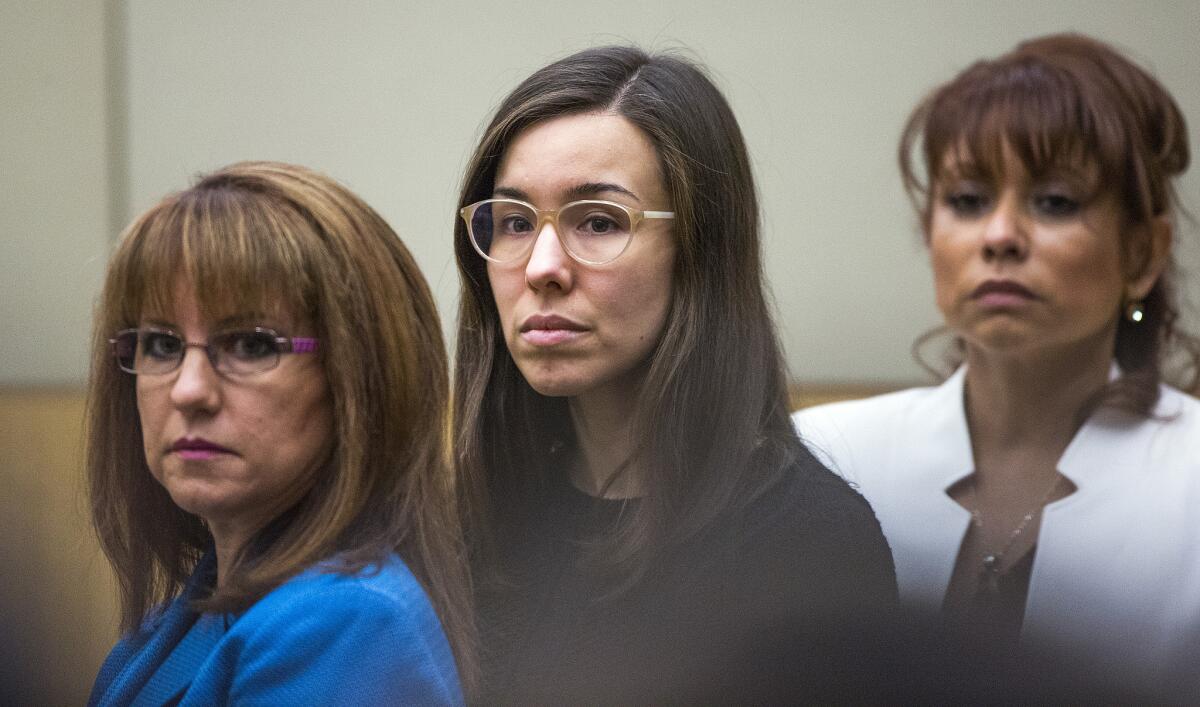Jodi Arias jury report: ‘My opinion isn’t being heard,’ holdout told judge

- Share via
Reporting from Phoenix — As the jury in the Jodi Arias trial reached an impasse last week, prosecutors and fellow jurors attempted to remove a holdout on the panel who was the only obstacle in the way of securing a death sentence against the convicted murderer.
A court document released Tuesday by the judge in the case reveals the behind-the-scenes wrangling in the jury room as Arias’ fate hung in the balance.
Jurors had questioned the holdout’s objectivity because she had previously watched a Lifetime movie about the Arias case, and prosecutors were upset at the juror’s social media activity as she went on Facebook and “liked” several local TV stations and Nancy Grace of the HLN network.
The holdout juror said her views were being ignored by the 11 jurors who wanted Arias to be executed for murdering boyfriend Travis Alexander nearly seven years ago.
“My opinion isn’t being heard,” the judge quoted the holdout as saying.
A court Tuesday announced it was launching an internal investigation into how the identities of Arias jurors were revealed online just hours after the trial ended. Arizona law prohibits the public release of a juror’s identity, though many of the Arias panel members agreed to speak with reporters after the trial ended.
The holdout’s identity was leaked through a Twitter account that also posted sympathetic comments about Alexander. A pro-Arias website also published names of 11 people it said were the jurors who voted to sentence Arias to death for the 2008 killing.
“Juror safety and the protection of jurors’ personal and confidential information are topics the Court takes very seriously,” the Maricopa County Superior Court said in a statement released Tuesday.
Dwane Cates, a criminal defense attorney in Phoenix who isn’t involved in the Arias case, said the leaks won’t change the outcome of the case, noting that mistrial decisions can’t be appealed.
Arias was convicted of murder in Alexander’s death at a 2013 trial that became a global sensation with its revelations about her sexual relationship with the victim and how she had slit his throat so deeply that he was nearly decapitated. A new jury was picked to decide her punishment after the first jury deadlocked on that question.
A mistrial on sentencing was declared Thursday after five days of deliberations, removing the death penalty as a possible punishment for Arias. The judge is scheduled to decide on April 13 whether Arias will spend the rest of her life in prison or be eligible for release after serving 25 years.
Most of the jurors said last week that they believed the holdout was biased and opposed to giving the death penalty. Judge Sherry Stephens had individually questioned some of the jurors, including the holdout, who said she wasn’t socializing at lunch with other jurors in an effort to be impartial.
Stephens said the holdout had disclosed, before being picked as a juror, that she had seen the Lifetime movie about the Arias case, but never watched it all the way through. The judge said the holdout juror didn’t commit misconduct because she clearly disclosed that she had seen the movie.
The judge also refused a request by prosecutors to remove the holdout from the jury because she had liked on her Facebook page another film that Arias found influential. And the case’s chief investigator said the holdout, who had said she recently had been keeping away from Facebook, had liked several local TV stations and Nancy Grace of the HLN network.
The judge noted that it would take two weeks to get records from Facebook to determine whether the holdout had clicked on news feeds on her page.
More to Read
Sign up for Essential California
The most important California stories and recommendations in your inbox every morning.
You may occasionally receive promotional content from the Los Angeles Times.













